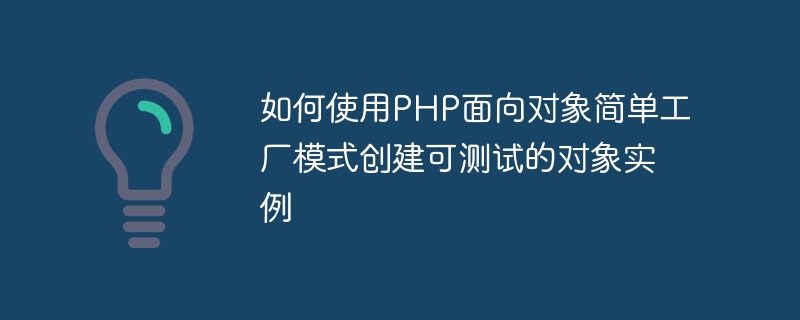

How to use PHP object-oriented simple factory pattern to create testable object instances
The simple factory pattern is a commonly used software design pattern, which can help us according to different Create different object instances based on the conditions. In PHP object-oriented programming, combining the simple factory pattern can improve the testability and maintainability of the code.
In this article, we will learn how to create testable object instances using the PHP object-oriented simple factory pattern. We will illustrate this process with a simple example.
First, let us define an interface to represent the common behavior of the object to be created. Suppose we have an interface namedAnimal, which contains asoundmethod:
interface Animal { public function sound(); }
Next, let’s implement some specific animal classes, such asCatandDog. These classes all implement theAnimalinterface and implement their ownsoundmethods:
class Cat implements Animal { public function sound() { return "Meow"; } } class Dog implements Animal { public function sound() { return "Woof"; } }
Now, let’s create a simple factory classAnimalFactory, which creates different animal object instances based on input parameters. This factory class has only one static methodcreateAnimal:
class AnimalFactory { public static function createAnimal($animalType) { switch ($animalType) { case 'cat': return new Cat(); case 'dog': return new Dog(); default: throw new Exception("Unsupported animal type"); } } }
Now, we can use this simple factory class to create different types of animal object instances. For example, we can create an instance of a cat like this:
$animal = AnimalFactory::createAnimal('cat'); echo $animal->sound(); // 输出 "Meow"
Similarly, if we want to create an instance of a dog, we only need to change the parameters to'dog':
$animal = AnimalFactory::createAnimal('dog'); echo $animal->sound(); // 输出 "Woof"
One of the benefits of using the simple factory pattern is that we can easily replace or add new object types without modifying the client's code. For example, if we want to add a new animal classBird, we only need to add the correspondingcasestatement in the factory class.
An important advantage of using the object-oriented simple factory pattern is that it can improve the testability of the code. Since the dependencies in the code are encapsulated in factory classes, we can easily perform unit testing by using mock objects or stub objects in place of our animal classes.
Let us look at an example of testing using the unit testing framework PHPUnit:
class AnimalFactoryTest extends PHPUnitFrameworkTestCase { public function testCreateAnimal() { $animal = AnimalFactory::createAnimal('cat'); $this->assertInstanceOf(Cat::class, $animal); $this->assertEquals("Meow", $animal->sound()); } }
Through the above test, we can verify whether theAnimalFactoryclass successfully creates aCatObject instance, and whether thesoundmethod of this instance returns the correct result.
To sum up, the PHP object-oriented simple factory pattern can help us create different object instances according to different conditions and improve the testability and maintainability of the code. By encapsulating the object creation process in a factory class, we can easily replace or add new object types and perform unit testing conveniently. It is indeed an important design pattern that can improve code quality.
The above is the detailed content of How to create testable object instances using PHP object-oriented simple factory pattern. For more information, please follow other related articles on the PHP Chinese website!




